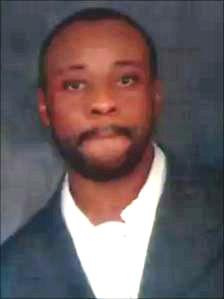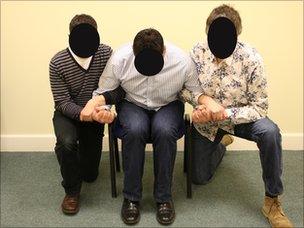MPs attack private security guard immigration removals
- Published

Mr Mubenga was being escorted by staff from the private security firm G4S
Private security guards employed to forcibly remove people from the UK have used racist language and inappropriate force, a report by MPs has said.
The Commons' Home Affairs Committee said the UK Border Agency should challenge unacceptable behaviour by some of its contractors.
The report comes 15 months after a deportee died on a flight.
A spokesman for the UKBA said that all private security escorts are trained in approved restraint techniques.
Jimmy Mubenga, 46, fell ill and collapsed on a British Airways plane bound for Angola on 12 October 2010.
The MPs did not comment on the case, which is still being investigated by the police, but said that Mr Mubenga's death had triggered their own investigations into the way that the UK Border Agency managed the deportation of people on flights from the UK.
The UKBA contracts out the job of escorting people to their deportation flight. The contract has been held by Reliance since May 2011 and previously by G4S.
The MPs said found:
Inappropriate use of physical restraint, including some techniques that could be dangerous
Some contractors using racist language
Excessive numbers of security guards for some deportations
"It is a matter for serious concern that contractors should use racist language among themselves," said the report.
"That they were content to do so in front of not only UK Border Agency staff but also inspectors from HM Inspectorate of Prisons is shocking. It is possibly the result of a relationship between the Agency and its contractors which had become too cosy."
Restraint techniques
The MPs said that the UKBA's own staff should feel that they can properly challenge any bad behaviour by contractors - but it also criticised the practice of taking "reserves" to airports - people who may then find that they are not being removed from the UK after all.

Restrained: A volunteer in a scientific test suffered breathing problems during tests
It called on the government to allow independent monitors, people allowed into prisons and removal centres, to board removal flights.
The MPs said that they were not convinced that a potentially harmful head-down restraint position was never used, even though it was not authorised.
A recent expert report found that such techniques could lead to death.
"We recommend that the Home Office issue urgent guidance to all staff involved in enforced removals about the danger of seated restraint techniques in which the subject is bent forwards.
"We also recommend that the Home Office commission research into control and restraint techniques which are suitable for use on an aircraft. The use by contractors of unauthorised restraint techniques, sanctioning their use, or failing to challenge their use, should be grounds for dismissal."
Keith Vaz MP, chairman of the committee, said: "The UK Border Agency must not wash its hands of responsibility for detainees just because the service is contracted out.
"People who are not entitled to remain in the country must be removed and there may be occasions when it is necessary to use physical force, but this must always be done only when absolutely necessary, and with proper respect for the dignity of the detainee."
A UKBA spokesman said: "All escorts on flights are trained to use restraint techniques approved by the Prison Service.
"We have no evidence contractors use head-down restraints and would take strong action against them if their conduct does not meet our standards.
"We are currently working closely with Noms (National Offender Management Service) to develop specific techniques appropriate to confined spaces."
- Published12 November 2010
- Published27 July 2011
- Published20 October 2010
- Published18 October 2010
- Published16 October 2010
- Published15 October 2010
- Published14 October 2010